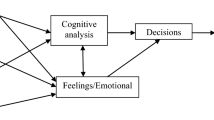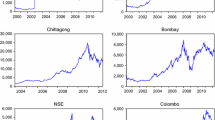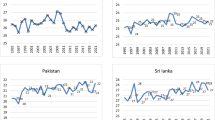Abstract
Psychological evidence suggests close relationships between weather and mood. Individuals feel in a more positive frame of mind on sunny than cloudy days. This study applies GJR–GARCH to examine the relationship among weather, stock returns and risk in Taiwan from 2001 to 2007. The empirical results indicate that precipitation does not significantly influence stock return and risk; likewise, sunshine hours and temperature insignificantly influence stock return, but do significant impact stock risk. These findings demonstrate that weather effect really exist in stock market, and can help investors in making innovative investment and management decisions.
Similar content being viewed by others
References
Akaike, H.: Information theory and an extension of the maximum likelihood principle In: Petrov, B.N., Csaki, F. (eds.) Second International Symposium on Information Theory, pp. 267–281 (1973)
Bollerslev T.: Generalized autoregressive conditional heteroskedasticity. J. Econ. 31(3), 307–327 (1986)
Bell P.A., Greene T.C., Fisher J.D., Baum A.S.: Environmental psychology. Wadsworth, Belmont (2003)
Brown G.W., Cliff M.T.: Investor sentiment and the near-term stock market. J. Emp. Finance 11(1), 1–27 (2004)
Clarke R.G., Statman M.: Bullish or bearish?. Finance Anal. J. 54(3), 63–72 (1998)
De Bondt, W.F.M., Thaler, R.H.: Financial decision-making in markets and firms: a behavioral perspective. In: Jarrow, R.A., Maksimovic, V., Ziwmba, W.Z. (eds.) Handbook in operations research and management science vol. 9 pp. 385–410 (1995)
Eagles J.M.: The relationship between mood and daily hours of sunlight in rapid cycling bipolar illness. Biol. Psychol. 36(6), 422–424 (1994)
Engle R.F.: Autoregressive conditional heteroskedasticity with estimates of the variance of United Kingdom inflation. Econometrica 50(4), 987–1007 (1982)
Engle R.F., Ng V.K.: Measuring and testing the impact of news on volatility. J. Finance 45(5), 1749–1778 (1993)
Fisher K.L., Statman M.: Investor sentiment and stock returns. Financial Anal. J. 56(2), 16–23 (2000)
Forgas J.P., Bower G.H.: Mood effects on Person-perception judgments. J. Personal. Soc. Psychol. 53(1), 53–60 (1987)
Friedmann R., Sanddorf-Köhle W.G.: Volatility clustering and nontrading days in Chinese stock markets. J. Econ. Bus. 54(2), 193–217 (2002)
Glosten L.R., Jagannathan R., Runkle D.E.: On the relation between the expected value and the volatility of the nominal excess return on stocks. J. Finance 48(5), 1779–1801 (1993)
Harvey C.R., Siddique A.: Autoregressive conditional dkewness. J. Financial Quant. Anal. 34(4), 465–487 (1999)
Hentschel L.: All in the family—nesting symmetric and asymmetric GARCH models. J. Financial Econ. 39(1), 71–104 (1995)
Hirshleifer D., Shumway T.: Good day sunshine: stock returns and the weather.. J. Finance 58(3), 1009–1032 (2003)
Hollwich F.: The influence of ocular light perception on metabolism in man and in animal. Springer, New York (1979)
Howarth E., Hoffman M.S.: A multidimensional approach to the relationship between mood and weather. Br. J. Psychol. 75(1), 15–23 (1984)
Jarque C.M., Bera A.K.: A test for normality of observations and regression residuals. Int. Stat. Rev. 55(2), 163–172 (1987)
Kamstra M.J., Kramer L.A., Levi M.D.: Winter blues: a SAD stock mrket cycle. Am. Econ. Rev. 93(1), 324–343 (2003)
MacKinnon J.G.: Value for cointegration tests in advanced texts in econometrics. Oxford University Press, Oxford, UK (1991)
Neal R., Wheatley S.M.: Do measures of investor sentiment predict returns?. J. Financial Quant. Anal. 33(4), 523–547 (1998)
Saunders E.M.: Stock prices and wall street weather. Am. Econ. Rev. 83(5), 1337–1345 (1993)
Schwarz G.W.: Estimating the dimension of a model. Ann. Stat. 6(2), 461–464 (1978)
Schwarz N., Clore G.L.: Mood, misattribution, and judgments of well-being: informative and directive functions of affective states. J. Personal. Soc. Psychol. 45(3), 513–523 (1983)
Schwarz F.: Und jetzt- die wirtschaftsaussichten. Murmann Verlag GmbH, Hamburg, Germany (2005)
Shefrin H.: Beyond greed and fear: behavioral finance and the psychology of investing. Harvard Business School Press, Watertown, MA (2002)
Shiller, R.J.: Human behavior and the efficiency of the financial system, handbook of macroeconomics. In: Taylor, J.B., Woodford, M. (eds.) Handbook of macroeconomics, Ed. 1, Vol. 1, No. 20, pp. 1305–1340 (1999)
Shleifer A.: Inefficient markets: an introduction to behavioral finance. Oxford University Press, Oxford (2000)
Thaler R.H.: Mental accounting matters. J. Behav. Decision Market. 12(3), 183–206 (1999)
Tietjen G.H., Kripke D.F.: Suicides in California (1968–1977): Absence of seasonality in Los Angeles and Sacramento counties. Psych. Res. 53(2), 161–172 (1994)
Wang Y.H., Lin C.T.: The effect of congressional sessions on the stock market in emerging democracy: the case of Taiwan. Hitotsubashi J. Econ. 48(2), 199–212 (2007)
Wright W.F., Bower G.H.: Mood effects on subjective probability assessment. Org. Behav. Human Decis. Process. 52(22), 276–291 (1992)
Yeh Y., Lee T.: The interaction and volatility asymmetry of unexpected returns in the greater China stock markets. Global Finance J. 11(1), 129–149 (2000)
Author information
Authors and Affiliations
Corresponding author
Rights and permissions
About this article
Cite this article
Wang, YH., Lin, CT. & Lin, J.D. Does weather impact the stock market? Empirical evidence in Taiwan. Qual Quant 46, 695–703 (2012). https://doi.org/10.1007/s11135-010-9422-9
Published:
Issue Date:
DOI: https://doi.org/10.1007/s11135-010-9422-9




